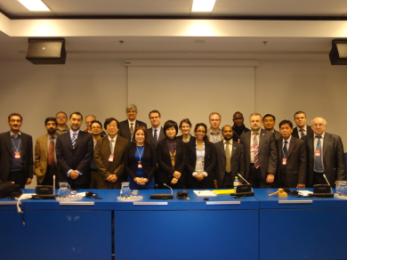UN-SPIDER inaugurated on 11 February 2013 its 4th Annual meeting of Regional Support Offices (RSOs) on the premises of the United Nations Office in Vienna, Austria. The meeting is a side event of the annual session of the Scientific and Technical Sub Committee of the Committee on Peaceful Uses of Outer Space (COPUOS) taking place from 11-22 February 2013. The meeting's participants included representatives from eleven of the thirteen RSOs and representatives of agencies from Russia, Indonesia and Nepal.
In his welcoming remarks, Mr. Takao Doi, Chief of Space Applications, highlighted the need for RSOs to define their role more clearly in the context of the UN-SPIDER programme, to sustain efforts to achieve the goals established in UN-SPIDER's plan of work and to discuss potential opportunities for cooperation when considering the Universal Access modality that the International Charter: Space and Major Disasters has recently established.
This annual meeting provided the RSOs an opportunity:
- to present the activities conducted in 2012 and to outline those to be conducted in 2013;
- to welcome the new RSOs,
- to discuss how to advance regarding the development of the "UN-SPIDER Recommended Practices" on rapid mapping and on the use of archived imagery to track how land-use/land-cover changes modify the spatial and temporal behavior of flood, drought and forest fire hazards;
- to discuss emergency response strategies;
- to coordinate the provision of technical advisory support in various regions of the world where UN-SPIDER is active;
- to discuss the role of RSOs in capacity building activities and other follow-up activities related to technical advisory support.
The two-day meeting included an official signing ceremony of a new RSO agreements between UNOOSA and ICIMOD in Nepal.
Outcomes of the RSO meeting include:
- Agreement on next steps towards developing recommended practices on the use of archived imagery for flood and drought;
- RSOs affirmed their support regarding the improvement of the UN-SPIDER knowledge portal (KP) following recommendations of an internal KP evaluation, e.g. by providing input to the envisioned eLearning environment or by becoming mentors of defined topics;
- Discussion initialized on possible evaluation mechanisms for technical advisory missions (TAMs);
- Progress was made in planning upcoming technical advisory support (TAS) activities;
- Discussion initialized to join forces and to develop a strategy to acquire commercial images for regional and global efforts within the UN-SPIDER mandate to close gaps which are not covered by existing mechanisms;
- Several RSOs are interested to become authorized users of the International Charter Space and Major Disasters;
- A comprehensive report on the RSO meeting will follow containing a joint workplan 2014-2015.
Last but not least: The RSOs are invaluable for the success of UN-SPIDER. The UN-SPIDER team would like to take the opportunity to thank you all for this productive meeting and for your continuous support!

